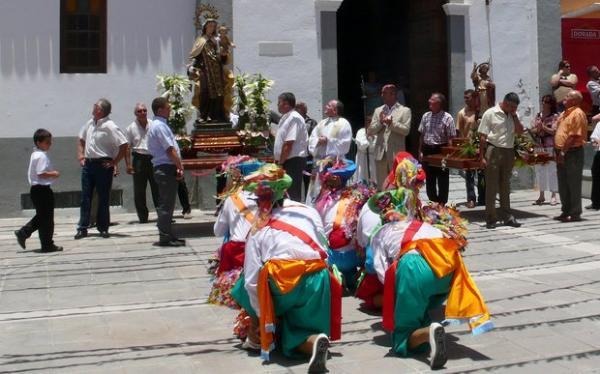On 16th July, dynamic and colourful festivities will take place across Latin America as the feast of La Virgen del Carmen is celebrated. Nathan Stone SJ reflects on the popular religiosity of Latin America that is often viewed with uncertainty by other Christians – could this unfamiliar form of devotion be a truly orthodox expression of faith?
Christianity in North America is tending increasingly towards practices and attitudes that I would consider to be pagan. Forms of Protestantism that are preoccupied with wealth and success are becoming more commonplace, maybe because the characteristics of this particular type of religiosity seem to fit better with current ideological currents and economic practice. As mainstream religion veers more and more in this direction in North America, it does so gradually in Latin America also, and so diverges from the popular religious devotion practised widely there. It is this latter form of devotion which has, ironically, tended to be equated with paganism, but I would suggest that in fact the opposite is true, and that the piety of the poor in Latin America gets it right where other Christian practices falter. A look at the pagan aspects of much contemporary Christianity can lead us to a new appreciation for unfamiliar, yet perhaps more orthodox, expressions of our faith.
Paganism and institutional favouritism
On this mountain the LORD of hosts will provide for all peoples, a feast of rich food and choice wines… (Isaiah 25:6)
Evangelical Protestantism is advancing in Latin America, though more slowly than some years back. In Chile, the balance has stabilised at about 70% Catholic, compared with 15% Protestant, and 15% non-believing. The military dictatorship gave quite a push to the evangelical religion, because evangelicals gave General Pinochet their total support. Their argument was that if anyone were tortured, mistreated or impoverished by the regime, then that was surely a sign that God did not favour them.
Currently, though, the wave that evangelical expansion rides upon is the one that promises prosperity. Traditional Protestantism spoke of justification by faith; today, we have justification by wealth. It’s the Puritan version. They work hard, or trade well, but business never goes badly for them – at least, that’s the theory. North American Evangelicals are openly calling this the ‘gospel of prosperity’, but it differs little from the old-fashioned Calvinism on which it is built. Good people do well; bad people don’t. There is nothing in between, and no way to make the transition from being a ‘bad’ person to being a ‘good’ one.
The countries that inch toward higher income expectations are adopting a new religion that validates that. The gospel of prosperitypreaches economic advancement as the exclusive sign of preferred status in God’s eyes. Being rich is understood as the deserved reward for having been born a lifetime member of the chosen few.
This version of Christianity is similar to paganism in its supposition that God predestines each and every one to salvation or damnation. Divine favour here is a bit more consistent than in the pagan system, but it is every bit as arbitrary. It boils down to a system of institutionalised favouritism – exactly the favouritism we reject in baptismal promises when we renounce ‘Satan and all his doings’. The deity of this version of Christianity loves those he wants to love; he favours them, and hates the rest. If that’s the way it is, then, how can anyone say ‘God is love?’
There is another interpretation of Christianity that fits within a pagan framework, and whose adherents practise their religion in order to secure God’s favour and so earn benefits from the great provider of goods and services. The pagan gods are providers of certain benefits and their faithful are the consumers who have to curry favour with the gods to obtain those benefits; similarly, these Christians want to sign the contract, show up at church once in a while, in exchange for health and success in this life. This is how our world works, so they try to make God work in the same way. This is called Pelagianism, and it was condemned as a heresy in the fourth century at the Council of Orange.
The Reformers, in their day, were vehemently anti-Pelagian. They never tired of accusing Catholics of that failing, because of the importance given to active love of neighbour in the Council of Trent. And yet, strangely, some of the heirs of the Reformation seem to have come almost full circle. It’s as if predestination put the chosen few in a position to hold the reins of power and there, by their efforts, they earn salvation for themselves. This, in turn, begins to sound like paganism, because they try to bend God’s will to theirs by offering up the blood of lambs.
Whenever I preach against this attitude, the faithful look at me as if I were out of my mind, as if to say, ‘obviously, we consider ourselves God’s favourites, and we have rightfully earned that. ‘ I find that to be pagan at the very least, if not downright superstitious. Some would say that priests encourage this pious self-righteousness, because it is their bread and butter – but it kills me. It’s the religious option for manipulators, who feel they must force God’s hand to their will.
The only God I have ever known invites everyone to an abundant banquet where everything is free. He calls in the good and the not so good, because he forgives and has no favourites. He leads me to green pastures, but even in the valley of the shadow, he is with me. This isn’t like paganism. The loving God of life, who pours out his blood so that others might live, is neither arbitrary nor capricious. He won’t be seduced by any attempt to garner favour. His love is just in the sense that it is universal, and in that it is universal, it is thereby forgiving.
A lot of people don’t like this. They ask: what about the coercive force for moral behaviour? Real Christianity doesn’t have any. Christian moral behaviour is not externally imposed. It’s freely and internally adopted. There is no threat that says, ‘behave or God won’t love you’. God loves sinners, he delights in the mortal fools we are. Taken by that outrageous mercy, we sinners then clean up our act – not to earn God’s love, but to give thanks for it, and to live in harmony with it.
This is one of the reasons I’m finding popular religious piety in Latin American Catholics so inspiring. Regardless of their behaviour, they are capable of throwing themselves down at the foot of the cross. They already understand that there is nothing of any importance that they can manipulate. So they give up, open up and love.
Animitas
Teacher, which commandment in the law is the greatest? He said to him, You shall love the Lord, your God, with all your heart, with all your soul, and with all your mind. The second is like it: You shall love your neighbour as yourself. The whole law and the prophets depend on these two commandments. (Matthew 22:36-40)
Some time ago, I was interviewed by some students for a paper they had to write. They insisted on knowing the teaching of the Church on the subject of animitas (literally, ‘little souls’). For those who don’t know them, these are mini-sanctuaries, built in places where people have died, usually in accidents or by violence.
Catholics usually make the sign of the cross when they pass by, and family members place candles to remember their loved ones. Some ‘ask for favours’, reasoning that if the departed are with God, they might have some influence. It is apparently quite effective to do business with Romualdito, for example. He was supposedly stabbed outside the train station in Santiago some decades ago. From the hundreds of tiny marble plaques, thanking him for favours granted, he would seem to have good contacts up there.
I felt obliged to answer sincerely. The Church doesn’t teach anything about that. It’s a local custom, and it’s nice to see that people have a way to show love and respect for their deceased friends and relatives. With the same respect, and moderation, Holy Mother Church knows there is a time to be silent.
These are what we call private devotions. The Church respects them. She doesn’t condemn, nor does she promote them. This is culture, feeling and tribal character. It’s not dogma. We pray for those who have died, because we believe that the Lord’s mercy is everlasting, even beyond the grave. How one might do that varies from place to place. The whole point of the earliest recorded ecclesiastical controversy, the one about the inclusion of the gentiles, is precisely that every culture has its quirks, and that most of them are not incompatible with the faith.
Traditional religiosity has that special grace, sometimes, of being the only door through which many people can find their way into the deeper mysteries. And it’s a fine thing that we have so many different ways to include the fallen among the communion of saints. Some of them were role models for those of us who remain behind. Some were not, but we need a space where we can forgive them, too, and invoke that unconditional mercy, and then move on.
On the other hand, when the supposed ‘requirements’ of personal devotion displace the main idea – loving God with all your heart and soul and your neighbour as yourself – we find ourselves wrapped up in an important imbalance.
Recent surveys in the Americas have suggested that sometimes those who consider themselves to be ‘very religious’ tend to be insensitive to the plight of the needy. I guess that depends on what one understands by ‘religious’. In this case, to be ‘religious’ is perhaps synonymous with what we would call being ‘self-righteousness’. King James English translates ‘justice’ as ‘righteousness’ ninety percent of the time.[1] That’s a different idea. ‘Self-righteous’ believers might seek to distance themselves from the ‘non-righteous’, those people that God (their version) has arbitrarily chosen not so save. They would tend to be the ones who are most reticent to take in the dispossessed, include the forgotten, and lend a hand to the homeless. They might be the first to fear strangers and immigrants. They would perhaps be the most insecure, and therefore suffer from a neurotic desire to control others, especially the dangerously poor, dark and downtrodden.
There is elsewhere, on the other hand, a statistical correlation between church attendance and volunteering[2], which would seem to suggest heightened compassion among believers. Perhaps the best of the churchgoers might not even call themselves ‘religious’ at all, but rather pardoned sinners, called into service, like St. Paul.
In some ways, the sincerest religiosity in the world is the humility of the poorest, to whom the Kingdom belongs. The dancers in silk costumes who have prayed with their legs to the beat of a drum for generations understand that they are really not in control of anything that matters. Their surrender to the Mother of their Lord, so that she might take their humble plea to her merciful Son, is the essence of the Christian attitude: surrender to mercy, accept it.
Saints and sinners dance together, all night long. Some, disguised as colourful demons, pretend to distract the gaze of the dancers from the face of their Lady. And they fail. This form of worship was despised for decades by the Europeanised city dwellers, because it wasn’t in Latin, or because it had different rubrics that they couldn’t see or decipher. But they are still here and, since the conference of Puebla in 1979, are recognised alongside the great processions and pilgrimages of the European tradition, as expressions that ‘extend the liturgical life of the Church, but do not replace it.’[3]
Holy Mother Church keeps a watchful eye on her dancers. She seems to worry about how they will be perceived by the modern world. In the theological sense, however, the suspicion is unfounded, because the tradition tends to correct itself. In the Mexican version, where the matachines dance for Our Lady of Guadalupe, she reminds Juan Diego, every year, that she wants a sanctuary built on this sacred (Mexican) ground. She says:
I want very much that they build my sacred little house here, … to give Him (Christ) to the people in all my personal love, in my compassionate gaze, in my help, in my salvation, because I am truly your compassionate mother, yours and of all the people of different ancestries who live together in this land, those who love me, those who cry to me, those who seek me, those who trust in me, because there I will listen to their weeping, their sadness, to remedy, to cleanse and nurse all their different troubles, their miseries, their suffering.[4]
The text is over four hundred years old. How similar it is to the opening lines of Gaudium et spes, and every Mexican child knows it by heart.
Nathan Stone SJ is a native Texan, 1979 graduate of the University of Notre Dame, and 1987 MA from the University of Texas, with a concentration in rhetoric. As a teaching volunteer in Chile, and inspired by the Ignatian model, he became a Jesuit in 1992. A member of the Chilean province, he studied Theology at the Pontifical Catholic University of Chile, and he was ordained to the priesthood there in 2000. He has worked in education, youth and social action ministry in Santiago, Antofagasta and Montevideo.
[1]In the King James Bible, ‘righteousness’ appears 302 times, two thirds in the Old Testament. ‘Justice’ appears only 28 times, all in the Old Testament. ‘Righteous’appears 238 times, three fourths in the Old Testament. And ‘just’appears only 94 times, three fifths in the Old Testament.
[2]http://www.homeoffice.gov.uk/rds/pdfs04/hors289.pdf ; http://findarticles.com/p/articles/mi_7083/is_3_17/ai_n28511096/pg_1; http://www.thinkingfaith.org/articles/20080609_1.htm
[3]Catechism of the Catholic Church, 1675
[4] Nican Mopohua,chapter 1, lines 26-30






